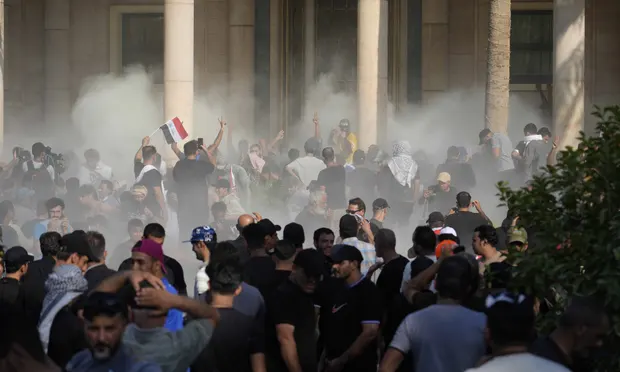Iran has closed its land borders to Iraq as flights to the country halted amid violence in Baghdad following an influential Shia cleric’s announcement he would resign from politics.
The death toll rose to 20 on Tuesday after unrest erupted the previous day, according to a senior medical official.
Iraq’s military said four rockets were launched into the heavily fortified Green Zone, the seat of Iraq’s government, where armed clashes raged overnight between a militia loyal to the Iraqi cleric, Muqtada al-Sadr, and Iraqi security forces.
Iranian state television cited “unrests” and “curfew” in Iraqi cities for the reason for the border closures. It urged Iranians not to go to Iraq while urging Iran’s Shia pilgrims in Iraq to avoid further travel between cities.
The decision came as millions of Iranians were preparing to visit Iraq for annual pilgrimage to Shia sites.
Kuwait, meanwhile, has urged its citizens in neighbouring Iraq to leave the country. The state-run KUNA news agency also encouraged those hoping to travel to Iraq to delay their plans over the eruption of violent street clashes between rival Shia groups in the country.
The Gulf Arab sheikhdom of Kuwait shares a 158 mile-long border with Iraq.
Dubai’s long-haul carrier Emirates stopped flights to Baghdad on Tuesday in response to the unrest in Iraq. It said it was monitoring the situation closely. It did not say whether flights would resume for Wednesday.
Protesters loyal to Sadr, who resigned on Monday, pulled down cement barriers outside the government palace with ropes and breached the palace gates. Many rushed into the lavish salons and marbled halls of the palace, a key meeting place for Iraqi heads of state and foreign dignitaries.
Iraq’s military announced a nationwide curfew, and the caretaker premier suspended cabinet sessions in response to the violence. Medical officials said dozens of protesters were wounded by gunfire and teargas and clashes with riot police.
Source: The Guardian

